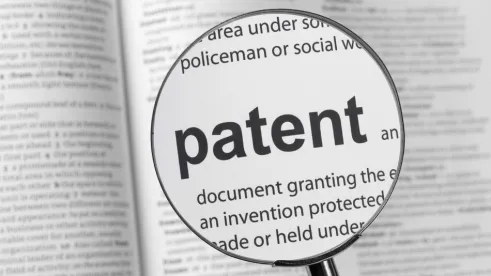Patent owners worry about what they can and cannot publicly say about infringement of their patent rights. Accused infringers may believe that certain public statements by patent owners are actionable on the basis that such statements interfere with business, are defamatory, or both. Last month, the Federal Circuit clarified what can and cannot be said about patent rights and infringement when it vacated a preliminary injunction that restricted patent owner Lite-Netics, LLC, from speaking publicly about infringement of its magnetic holiday string lights patents by competitor Holiday Bright Lights (HBL). As a result, Lite-Netics (and other patent owners similarly situated) has the green light to speak publicly about infringing activity, and infringers provided that its patent-related speech is not objectively baseless.
Background
A few months before bringing suit against HBL in the United States District Court for the District of Nebraska for infringement of U.S. Patent Nos. 7,549,779 and 8,128,264 for magnetic decorative lights (Lite Patents), Lite-Netics sent a first notice to its customers (some of which were shared customers with HBL) making them aware “of recent attempts by other companies to make and sell similar products” as claimed in the Lite Patents and stating its intention to go after these allegedly infringing competitors. Shortly after the suit against HBL was filed, Lite-Netics sent a second notice to its customers specifically identifying HBL as an infringer of the Lite Patents. The second notice included a copy of the first page of the complaint filed against HBL and also threatened suit against any company using or reselling HBL’s Magnetic Cord and Magnetic Clip string light products. In response to the complaint and Second Notice, HBL moved to dismiss the complaint, filed counterclaims based on federal and state-law unfair competition, as well as several other state-law torts, and moved for a temporary restraining order (TRO) and a preliminary injunction based on two of the state law counterclaims (i.e., tortious-interference and defamation) in an attempt to stop Lite-Netics from making accusatory statements about HBL.
Lower Court Decision
The district court initially granted the TRO for 14 days and then extended it for another 14 days. In deciding on the preliminary injunction motion, the district court evaluated the (1) HBL’s likelihood of success on the merits of its tortious-interference and defamation claims; (2) the likelihood of irreparable injury to HBL without the injunction; (3) the balance of equities; and (4) the public interest. With respect to the first factor, the district court acknowledged that state-law tort claims based on the communication of patent rights “are preempted by federal patent laws, unless the claimant can show that the patent holder acted in bad faith.” However, the court found that federal preemption did not apply because Lite-Netics’s infringement allegations lacked any merit and, as such, its assertions to its customers against HBL were made in bad faith. On that basis, the court ruled that HBL would likely succeed on its tortious-interference and defamation claims and, because the other three factors favored issuance, granted the preliminary injunction.
The injunction ordered Lite-Netics (and its officers, directors, shareholders, and other agents) to refrain:
from making statements via letters, emails, Facebook, Twitter, or any other social media, mass media, direct marketing, robocalls, press releases, blogs, websites or otherwise suggesting “copying” by HBL, suggesting HBL customers will be burdened as additional defendants in this or any lawsuit, or suggesting that HBL is a patent infringer.
Lite-Netics appealed.
Appellate Reversal
While the Federal Circuit agreed that precedent dictated that HBL’s state-law claims could survive federal preemption if there was a showing of bad faith by Lite-Netics in asserting infringement, the panel disagreed with the lower court that there was such a bad-faith showing. The appellate panel explained that (a) bad faith cannot be met in the absence of a showing that the claims asserted were objectively baseless and (b) an infringement allegation is objectively baseless only if no reasonable litigant could realistically expect success on the merits. In reviewing Lite-Netics’s infringement allegations, the panel found that there was an objectively reasonable basis for a number of those allegations at this stage of the litigation (i.e., before full claim-construction proceedings and/or expert reports). It thus held that the lower court abused its discretion in finding that Lite-Netics could not have “realistically expect[ed] success on the merits” and acted in bad faith.
Key Takeaway
The Federal Circuit noted here that “[t]he First Amendment principles are particularly significant when an injunction against speech is at issue” and previously explained that “[t]his is . . . an injunction against communication, a much more serious matter. . . that must be used with care and only in exceptional circumstances.” Those exceptional circumstances require a showing of bad faith, which requires a showing that the infringement allegations are objectively baseless. A patent infringement allegation is objectively baseless only if “no reasonable litigant could realistically expect success on the merits.” To be clear, an incorrect allegation of patent infringement is not necessarily objectively baseless (even if claim construction ultimately goes in a direction that does not support the patent owner’s infringement allegations). In fact, a patent owner that is “acting in good faith on its belief as to the nature and scope of its rights, is fully permitted to press those rights ‘even though he may misconceive what those rights are.’”
Enjoining a patent owner’s communication of its patent rights is rare (even if that communication turns out to be incorrect). Patent owners have the green light to speak freely about their rights (and others infringing on those rights) but must do so in good faith.




 />i
/>i

